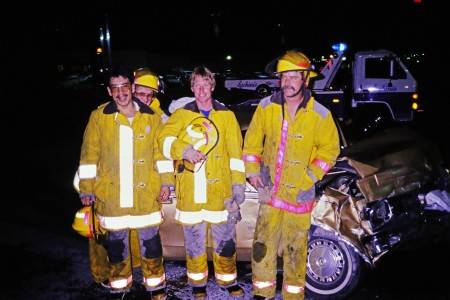TACHYCARDIA / WIDE
ALL LEVELS
DESIGNATION OF CONDITION
Patient who presents with sustained Ventricular Tachycardia or Wide Complex Tachycardia with pulse present. These patients may be conscious or unconscious. “Unstable” indicates symptoms such as chest pain, dyspnea, hypotension, CHF, ischemia, or unconsciousness. “Stable” patients with sustained ventricular tachycardia will not have these symptoms but must be monitored carefully for onset of such symptoms.
EMPHASIS ON PATIENT CARE
Maintain adequate perfusion, adequate oxygenation, ALS intervention
1. Primary Management - Assess ABC’s and manage as indicated.
2. Turn the defibrillator/monitor on and apply defibrillation electrodes.
3. Initiate transport to an appropriate medical facility. Consider ALS intercept.
4. Secondary Management - History, physical exam, vital signs
a. If suspected AMI, administer ASPIRIN [325 mg PO]. Chewed then swallowed
5. If the patient becomes unconscious and pulseless, follow Medical Cardiac Arrest Treatment Guidelines.
AEMT
1. In-route, initiate an IV of an isotonic solution at a TKO rate.
2. Caution: Use of Nitroglycerin or Narcotic Pain Relievers for patients with VT rhythm may precipitate cardiac arrest
PARAMEDIC
1. If stable wide complex tachycardia or if patient has mild symptoms of decompensation:
a. If supraventricular tachycardia with aberrancy is suspected, consider ADENOSINE [6 mg] rapid IV/IO push (1-2 seconds) followed by a 20mL flush of Normal Saline.
b. If Ventricular Tachycardia consider AMIODARONE [150mg] over 10 min.
c. May also consider MAGNESIUM SULFATE [2 gm. diluted in 10ml over 2 min.] slow IV/IO particularly when Torsades suspected.
2. If hemodynamically unstable wide complex tachycardia:
a. Prepare for immediate Synchronized Cardioversion, MIDAZOLAM [2-4 mg] IV/IO/IN/IM, prior to cardioversion, if appropriate to patient condition.
b. Cardiovert at 200 joules, maximum energy.
c. If patient’s cardiac rhythm changes, treat per applicable guidelines.
3. If tachycardia is iIRREGULAR but wide complex, consider Atrial Fibrillation with a Rapid Ventricular Response (RVR). If patient is unstable with a pulse attempt to synchronize but it may be necessary to defibrillate.
a. Consider MIDAZOLAM [2-4 mg] IV/IO/IN/IM, prior to defibrillation, if appropriate to patient condition.
b. Cardiovert or defibrillate at 200 joules. Repeat as needed and tolerated.
ALL LEVELS
DESIGNATION OF CONDITION
Patient who presents with sustained Ventricular Tachycardia or Wide Complex Tachycardia with pulse present. These patients may be conscious or unconscious. “Unstable” indicates symptoms such as chest pain, dyspnea, hypotension, CHF, ischemia, or unconsciousness. “Stable” patients with sustained ventricular tachycardia will not have these symptoms but must be monitored carefully for onset of such symptoms.
EMPHASIS ON PATIENT CARE
Maintain adequate perfusion, adequate oxygenation, ALS intervention
1. Primary Management - Assess ABC’s and manage as indicated.
2. Turn the defibrillator/monitor on and apply defibrillation electrodes.
3. Initiate transport to an appropriate medical facility. Consider ALS intercept.
4. Secondary Management - History, physical exam, vital signs
a. If suspected AMI, administer ASPIRIN [325 mg PO]. Chewed then swallowed
5. If the patient becomes unconscious and pulseless, follow Medical Cardiac Arrest Treatment Guidelines.
AEMT
1. In-route, initiate an IV of an isotonic solution at a TKO rate.
2. Caution: Use of Nitroglycerin or Narcotic Pain Relievers for patients with VT rhythm may precipitate cardiac arrest
PARAMEDIC
1. If stable wide complex tachycardia or if patient has mild symptoms of decompensation:
a. If supraventricular tachycardia with aberrancy is suspected, consider ADENOSINE [6 mg] rapid IV/IO push (1-2 seconds) followed by a 20mL flush of Normal Saline.
b. If Ventricular Tachycardia consider AMIODARONE [150mg] over 10 min.
c. May also consider MAGNESIUM SULFATE [2 gm. diluted in 10ml over 2 min.] slow IV/IO particularly when Torsades suspected.
2. If hemodynamically unstable wide complex tachycardia:
a. Prepare for immediate Synchronized Cardioversion, MIDAZOLAM [2-4 mg] IV/IO/IN/IM, prior to cardioversion, if appropriate to patient condition.
b. Cardiovert at 200 joules, maximum energy.
c. If patient’s cardiac rhythm changes, treat per applicable guidelines.
3. If tachycardia is iIRREGULAR but wide complex, consider Atrial Fibrillation with a Rapid Ventricular Response (RVR). If patient is unstable with a pulse attempt to synchronize but it may be necessary to defibrillate.
a. Consider MIDAZOLAM [2-4 mg] IV/IO/IN/IM, prior to defibrillation, if appropriate to patient condition.
b. Cardiovert or defibrillate at 200 joules. Repeat as needed and tolerated.
